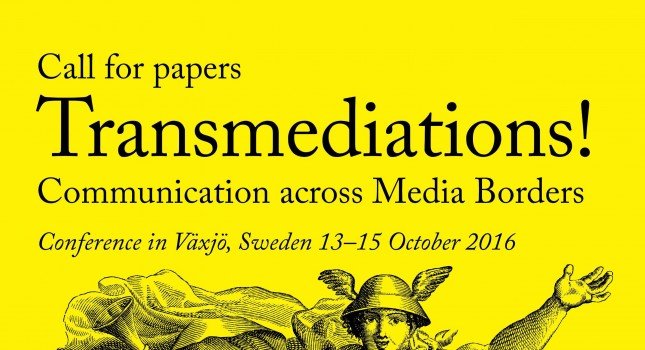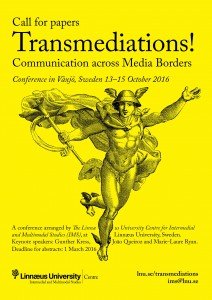
CFP: Transmediations! Communication across Media Borders
 The Linnæus University Centre for Intermedial and Multimodal Studies (IMS) invites researchers and research students to attend the conference Transmediations! arranged at Linnæus University, campus Växjö, Sweden, 13–15 October 2016 (from Thursday 9.30 am to Saturday 4 pm).
The Linnæus University Centre for Intermedial and Multimodal Studies (IMS) invites researchers and research students to attend the conference Transmediations! arranged at Linnæus University, campus Växjö, Sweden, 13–15 October 2016 (from Thursday 9.30 am to Saturday 4 pm).
Media can be understood as those entities that make communication among human minds possible. Whereas these entities are always material in some way – whether they are corporeal or external to the human body – their communicative abilities are determined by their capacity for creating mental response. Media are cultural products that cannot be fully understood unless both their specific physical traits and their capacity to affect cognition are taken into account.
One of the most astonishing capabilities of the interaction between media and human beings is that the outcome of one communicative act can successfully be mediated again through another kind of medium. A photograph in the newspaper may be described by spoken words; a musical score may be transformed to sounding music; the oral statements of a witness may be written down; a novel may be adapted to a movie; the gist of a scientific account may be rendered into a visual diagram; spoken words may be transmitted to sign language. These processes of transfer and transformation can be called transmediations.
Transmediation is an exceedingly common phenomenon in all kinds of communication. It is a cross-cultural and cross-historical phenomenon, which ultimately results from the flexibility of our minds evolved through thousands of years of multi-sensory interaction with a multi-material surrounding and communication with other minds in widely different situations. As transmediation cannot be accomplished seamlessly, it appears to be an acutely important matter with far-reaching consequences for our understanding of communication at large. Although the study of transmediation is not virgin soil (it has been investigated with shifting terminology in various subject areas), we need a deeper understanding of how the outcome of communication is modified – sometimes dramatically – when it is transferred among different types of media with various multimodal traits. Such an exploration should include, on the one hand, the inescapable media differences and similarities that set the limits for transmediation (transmediation involves material, spatiotemporal, sensorial, and semiotic borders being crossed), and, on the other hand, the equally unavoidable contextual factors that determine communication in general (transmediation being affected by culture, history, politics, ideology, education, and interpretive communities).
Theories for the discussions at the conference may be provided by research areas such as intermediality, multimodality, semiotics, communication, new media theory, cultural studies, adaptation studies, transmedial narratology, translation studies, visual studies, cognitive science, psychology, sociology, and theories of literature, film, and music. We especially encourage participants to suggest relevant theoretical frameworks that have not so far been at the frontline of transmedial investigations. Possible empirical areas are, for instance, face-to-face communication, aesthetic media, transmediations for physically or mentally impaired people, mass media, scientific discourse, classroom education, new media culture, reading and writing, and communication in legal proceedings. Investigations of other relevant empirical areas are also appreciated. Papers may be focused either on purely theoretical issues or on empirical investigations (such as analyses of specific media products) based on theoretical considerations.
The conference Transmediations! will include keynote speeches by Gunther Kress, João Queiroz, and Marie-Laure Ryan.
Official language of the conference is English. Each paper will be allotted 20 minutes for presentation and 10 minutes for discussion. Proposals for both individual papers and preconfigured sessions of two or three papers are welcome. There will be a strict selection of papers. As our goal is to attract participants from a broad area of research, papers and session with a marked interdisciplinary approach will be prioritized. Please send your abstract (around 300 words, including an informative title and a short bio) to ims@lnu.se. The conference website will provide you with more information and a link to the Linnæus University Centre for Intermedial and Multimodal Studies. The conference fee is 100€, which will cover lunches, a conference dinner, and other arrangements.
Welcome!
The conference committee
Deadline for abstracts: 1 March 2016.
Notification of acceptance: 18 March 2016.
Publication of preliminary conference program: 3 June 2016.
Deadline for registration and conference fee: 1 September 2016.

Leave a Reply
You must be logged in to post a comment.